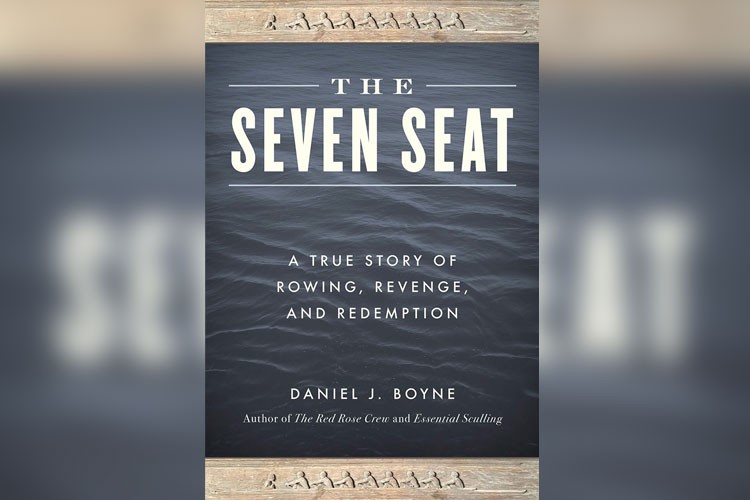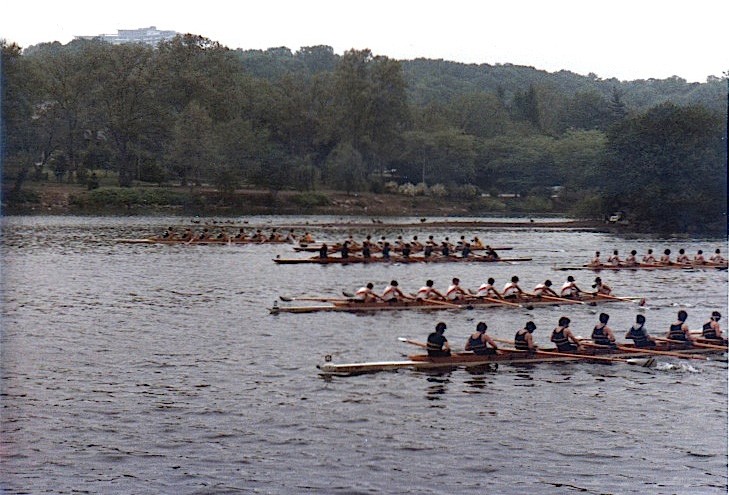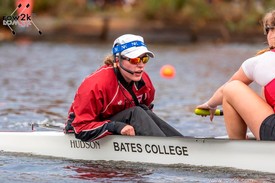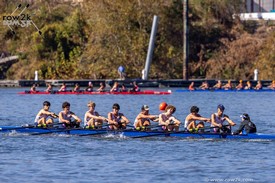
Dan Boyne's Introduction to his new book, The Seven Seat
Rowing, one of the oldest athletic endeavors in the western world, has finally captured the attention of the mainstream public, after hiding in plain sight for many decades. Films and books have begun to proliferate, giving voice to the many colors and shades of the sport, and texture to the strange tribe of modern-day Vikings who move across water with an oar in their hands. But when I was entering the sport, back in the 1970s, there were only a few books on rowing, and most of them were training manuals, tedious and dry. Then, in 1985, the celebrated journalist David Halberstam wrote The Amateurs and captured the raw beauty of rowing. Short, terse, and devoid of purple prose, it rang true in the rowing world and opened the door to other literary efforts.
I'd recently graduated from Trinity College in Hartford, CT, and when this book came out I took a silent vow that I would try to write a narrative, equal in measure. I was fortunate enough to fulfill my ambitions with three offerings - The Red Rose Crew, Kelly, and Essential Sculling. I thought I was done.
Yet in the back of my mind, a personal narrative of my college rowing days was still brewing—a lighthearted tale with a twist of revenge. The Seven Seat is that story. In a way, it is a whimsical little book, not too ambitious in scope, but rather a freshman-year frolic that is primarily meant to amuse. On the other hand, scattered throughout these pages, are some unique glimpses into the rowing world that may offer some deeper insights.
Many rowing narratives, like the sport itself, are overly serious in nature. In those fine books, men and women win Olympic gold medals, row across the Atlantic, survive divorce, or win World Wars. I wrote The Seven Seat, in part, to break out of this heroic mode, and make the reader laugh as they learn about the life of an ordinary crew of college oarsmen in the 1970s - a group of scrawny, non-recruited lightweights. What we accomplished with our oars could still be seen as inspirational, but what we did off the water was equally entertaining. Put more bluntly, heroism can get tedious when it lacks the balance of everyday life and all of its humorous absurdities.
Having been in the rowing world now for fourscore years - as an amateur competitor, coach, a writer, and even a film consultant for The Social Network - my focus has always been firmly rooted in celebrating the underdog, but it has shifted more and more toward those who are just "ordinary folk" involved with the sport. Rowing in general has followed this trend and finally opened its arms to the general public. It should be celebrated for its own sake and not just for those who reach the top pinnacles of the sport.
Conversely, on the collegiate level, a lot has changed since the days when this story took place. Trinity College no longer has lightweight crew, an unfortunate loss for my alma matter, and the recruiting of high school athletes is now a serious business, with big athlete incentives and better coaching salaries in play. At the elite level, professionalism has slowly crept back into the sport, with prize races offered at the Head of the Charles and elsewhere, as they once were in the late 19th century. But back in the days of disco, where this story begins, we were all still very much amateurs, with no idea what we were getting ourselves into, and. it is in that spirit of innocence that The Seven Seat unfolds and hopefully succeeds in rendering the simple joy of freshman crew.
(Author's Note: This is a work of "creative non-fiction," which means that it is more or less true. Some of the character's names have been altered, mostly to protect them any factual errors on my part.)

Foreword to Dan Boyne's The Seven Seat, by Ed Hewitt of row2k
The first year at university can be one of the most exhilarating and fulfilling yet equally confusing and even jarring experiences of a young adult life; the cacophony of new and diverse personalities combined with a sudden blitz of freedom, unforeseen obligations, and open-ended opportunities unlike anything you've ever experienced before. Add to that your first year on a rowing team, and it soon becomes one of the most intense experiences imaginable.
For many students, joining and becoming part of an athletic team is not only a daunting challenge, but also a deeply organizing influence that can give context to the onslaught of new impressions and responsibilities.
For experienced rowers and walk-on athletes alike (perhaps more so for walk-on athletes, a dying breed in our current times), the memories from that first year endure in an almost tactile way; the first ride to the boathouse, the first pass through the locker room, the first row, and the proximity of a strange new body of water beneath you, just inches away - all remain vivid for decades.
In my own first year of rowing, before frosh were absorbed into varsity programs, a freshman rowing squad was still a team unto itself, with its own coach, race times, practice times, rituals, and culture—and certainly its own personality. Many of us from that team recall each other as we were back then, and still refer to one another by nicknames bestowed in the first weeks and days of fall freshman rowing—names such as Tunes, Birdman, KFS, Breaks, Shakes, V, the Rowin' Samoan, Fust, Pas de Couilles, Rasta, Sleaze, Call Me Mike, Handkerchief Head, Pops (our coach), and more.
And whether it was a good year or a bad year for your team, there was a narrative throughput that was stronger and more vivid than almost any other of a rowing career. The massive mash-up of regional dialects, attitudes, and experiences is a lot to absorb, and many of the first impressions you have of one another stick forever.
Daniel Boyne captures that full tableau for himself and his Trinity cohorts here in The Seven Seat, parts of which we worked on together and serialized on row2k. With each new chapter, delivered to me almost at the moment it had been written, readers were able to follow along with the unexpected revelations of the layers of personality and depth of Boyne's teammates during moments away from the river, the role the coaches began to play in their college life, extracurricular activities that the coach and other authority figures were better off not knowing about, a few dicey moments shoulder-deep in a cold river, of course some matters of the heart, and a lot of pretty serious rowing.
In this "creative nonfiction" (as Boyne describes it) narrative of his first year at Trinity, we encounter multifaceted characters, comedians, rivals, leaders, fools, and more; Boyne's portrayal of his own fierce and loyal frosh coach is rich and illustrative, as are his portrayals of his teammates. Boyne's female characters are dimensional as well, which is not a surprise from the author of Red Rose Crew, the story of the 1975 U.S. women's eight.
The experiences away from the water that Boyne recounts are no less vivid nor essential, including the illicit climbing of storied architecture, various frat house hijinks, and more. Along the way Boyne simultaneously enhances and unmasks the reputations of rowing leg- ends, and wins a few races. Throughout it all Boyne is a somewhat- serious and self-aware observer (arguably as befits a seven seat), which does not prevent him from appreciating and engaging with the some- what less-studied sides of the other characters in the story.
It is also a revenge story, and any high school rower whose high school team was split into different factions at different universities knows both how intense and important those instant rivalries with former teammates can be. Certainly many remember the first time they looked across at the starting line and saw their former boat mates in the same seat but in the neighboring boat; The Seven Seat derives much of its narrative drive from just that moment.
Many rowers have a similar book stuck in their head, and Boyne offers a way for readers to recall those experiences, even if they are not inclined to write them down. As with many memoirs, a powerful part of the experience of reading along with Boyne is how the memories of our own first escapades in the sport and as college students and bud- ding adults are unearthed and reignited.
Boyne's story is honest as well. He and his teammates and coaches are likeable but certainly not perfect, and as I read I was reminded more than once of William Finnegan's unflinching memoir Barbarian Days: A Surfing Life - which of course won the Pulitzer Prize for Biography in 2016. It is unlikely that a book about rowing in Connecticut and Philadelphia will reach those heights, but there are similarities nonetheless.
As Boyne notes in the serialized version on row2k, the book is a "work of 'creative non-fiction,' which means that it is more or less true." With some names changed, it does become something of a roman a` clef, although it was vivid enough for many of the renamed folks such that, as we posted each chapter, I received emails along the lines of "Uh oh, I may show up in the next chapter, and probably as a villain." I won't reveal if any of these folks made it into the book, but certainly many of us will find a little bit of ourselves and our old team-mates in the college paths, rooftops, boathouses, and rowing seats in these pages.
—Ed Hewitt
If you enjoy and rely on row2k, we need your help to be able to keep doing all this. Though row2k sometimes looks like a big, outside-funded operation, it mainly runs on enthusiasm and grit. Help us keep it coming, thank you! Learn more.
Comments | Log in to comment |
There are no Comments yet
| |
- Bont Rowing
- Calm Waters Rowing
- Concept 2
- Craftsbury Sculling
- The Crew Classic
- CrewLAB
- Croker
- Dad Vail Regatta
- Durham Boat Co.
- Empacher
- Faster Masters
- Filippi
- Fluidesign
- h2row.net
- HUDSON
- Live2Row Studios
- Nielsen-Kellerman
- Oak Ridge RA
- Peinert Boat Works
- Pocock Racing Shells
- Race1 USA
- RowKraft
- Rubini Jewelers
- Vespoli USA
- WinTech Racing
- Bont Rowing
- Calm Waters Rowing
- Concept 2
- Craftsbury Sculling
- The Crew Classic
- CrewLAB
- Croker
- Dad Vail Regatta
- Durham Boat Co.
- Empacher
- Faster Masters
- Filippi
- Fluidesign
- h2row.net
- HUDSON
- Live2Row Studios
- Nielsen-Kellerman
- Oak Ridge RA
- Peinert Boat Works
- Pocock Racing Shells
- Race1 USA
- RowKraft
- Rubini Jewelers
- Vespoli USA
- WinTech Racing

















